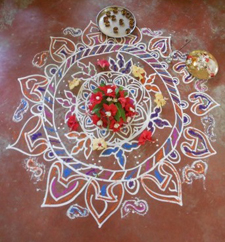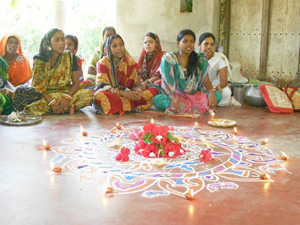By Avni Malhotra, Country Director, Heifer India

A rangoli is a colorful geometric pattern made inside the front door of a house to symbolize happiness in Indian culture. In the southern part of India, rangolis are made with white chalk powder every morning at dawn in front of every home. The only time they are not made is during periods of mourning. On special days, like festivals and weddings, rangolis are larger and more colorful.
On my recent trip to Odisha (Orissa), there was a very large and colorful rangoli at the meeting place where I was greeted by the villagers. There were grains of rice and a pot decorated with mango leaves and flowers in the center of the rangoli. It was circular, with 12 points on the outside of the circle. The women of the village introduced themselves,

and then some of the women shared Heifer’s 12 Cornerstones for Just and Sustainable Development. Each woman who shared stood and lit a small lamp to symbolize the Cornerstone and placed it at one of the 12 points.
To me, this symbolized that they value the Cornerstones, and that like the rangoli, they have become an intricate part of their lives.